RETRO MOVIE – In 1993, one of Steven Spielberg’s most influential and classic monster movies, Jurassic Park, was released based on Michael Crichton‘s novel. A huge success with critics, audiences and box office, the film is a landmark in the genre, launching a franchise with four sequels to date and a fifth, Jurassic Park: World Domination, arriving in cinemas next week.
With the sixth and ‘final’ film in the Jurassic Saga, Jurassic World: World Domination, due in cinemas in a few weeks, I decided to revisit each movie in the franchise – and I was helped by Pannonia Entertainment in Hungary, which is screening all the films before the sixth instalment. I did this not only to refresh myself but also to see each film with new eyes. Let’s start with the first Jurassic Park, which I saw on June 11, 1993, the day it premiered. In the decades since then, I’ve seen it dozens and dozens of times, mostly in snippets on cable. But watching it from beginning to end, without commercials, is an entirely different experience. You can really see why Jurassic Park has survived in popular culture to this day.
A simple scenario where survival is the key
The first thing that struck me on re-watching was the clear, uncluttered script, which still gives away all the essential information. Sure, Michael Crichton’s original idea of cloning dinosaurs in the modern age and putting them in an amusement park is brilliant in itself, but Crichton and David Koepp’s adapted script is so well constructed and dynamic that it could be taught in a screenwriting class.
From the very first scene, the audience is given several critical pieces of information without even knowing it, and then it seamlessly transitions to the next part. We start with a worker who is killed by a mysterious creature. In the next scene, we see a lawsuit over his death, and for the first time, we see a mosquito encased in amber. A character mentions Alan Grant (Sam Neill), and we cut to Alan Grant, who opens the film’s entire third act. Enter John Hammond (Richard Attenborough), the park’s owner, with an offer, and within moments Jurassic Park is off to the races.
No “mythology” here yet
This economy of storytelling continues throughout the film. Arguably, there is not a single scene that does not move the story forward or provide crucial character development. And that story is, for the most part, straightforward. Once Alan Grant, Ellie Sattler (Laura Dern) and Ian Malcolm (Jeff Goldblum) get to the island, they learn how dinosaurs came to be, ask questions about it, and then head off to the park. That’s basically it. We add the kids Tim and Lex (Joseph Mazzello, Ariana Richards) to up the emotional stakes and the Nedry (Wayne Knight) story to complicate everything, but pretty quickly, we get people wandering around a dinosaur-infested theme park.
To add to the simplicity, Jurassic Park is also almost entirely devoid of the mythology later built around it. In the later films, we learn about John Hammond’s company, InGen, his personal life, his friends, rivals and other companies vying for his discoveries. The world is expanding considerably. But that is not at all part of this film. We don’t know who Dodgson is who paid Nedry to steal the embryos. We don’t even care. It’s not about the outside world; it’s about the story, characters, and survival.
Perfect action scenes instead of the chaos of nowadays
Another thing I noticed during the re-watch was the absolute genius of the action scenes. These days we are used to chaotic action: quick cuts, explosions, flying cameras, practically non-stop chaos. Jurassic Park is not like that. At every moment, in every scene, you know exactly where each character is. Spielberg’s directing and editing are so clear that if you were to pause at any point during, say, the first T-Rex attack, any viewer could tell precisely where the characters are in relation to each other, and that only adds to the tension.
This is a practice the director uses in every single scene, with one witty, probably deliberate exception: by the time the Velociraptors corner Tim and Lex in the kitchen, we are so used to knowing who is where at every moment that when we see Lex trying to close the door of the booth and the raptor pounces on him, we are genuinely terrified. Spielberg then pulls the rug out from under us. We realise that the raptor has seen a reflection, and the adrenaline rush is nicely accelerated when it crashes, and Lex is rescued. This moment works so well because all the scenes surrounding it are perfectly designed to make the audience trust and understand what they are seeing.
A special atmosphere
Spielberg also ensures that throughout the film, the characters feel the wonder that we, the audience, should feel. In several scenes, Grant and Sattler react physically and emotionally to the revelations they see on screen, whether it’s the T-Rex in Jurassic Park or the beauty in a sick Triceratops. Even when Grant looks out of the helicopter window at the very end, he’s undoubtedly relieved, but he’s still impressed.
The fact that the characters on the screen are filled with wonder helps the audience to feel a sense of wonder at the spectacle and the events. No one is tired. No one is corrupt (OK, Nedry is corrupt, and we see where that leads). Everyone is simply in awe or awe of the magic and menace of the park. It creates an atmosphere that, if I remember correctly, only rarely returns in the rest of the franchise, making this film truly special.
It is also due to the masterful work of everyone who worked on the film. The script and direction have already been mentioned, but ILM’s digital effects, especially the T-Rex, are still almost impeccable 30 years later. John Williams’ music literally – and I mean literally this time – brings tears to my eyes every time I hear it in context. With the costumes, the sets, and the design, Jurassic Park is the culmination of hundreds of people working on a brilliant idea and creating something that lasts longer than any of us could have imagined.
Logical glitches, but a great experience
A couple of odd logical glitches make this film less than perfect. For example, how did John Hammond sneak into Grant and Sattler’s trailer in Montana? We see the helicopter coming for him, but how did he get there unnoticed by everyone else? Was he walking? Or by car?
I also can’t understand the improbable, illogical luck of a) finding a mosquito preserved in amber at all, but then b) this mosquito is 65-100 million years old, not, say, 20 million or 2 million or some other number; c) this mosquito sucked the blood of a dinosaur right before it got stuck in the sap, and then d) they find enough mosquitoes to get enough DNA to recreate all the different species of dinosaurs. The chances of finding a mosquito that had usable dinosaur blood must have been like winning the lottery every week for a year. But finding more than one? It’s simply astronomical odds. And yes, sure, it’s a science fiction movie, but at least the basic concept itself has a basic scientific sense and internal logic.
Logical blunders aside, Jurassic Park is one of Spielberg’s best films, and it’s still a great experience by today’s standards. The script, the direction, the acting, the editing, and the visuals are all first-rate, and no sequel or other monster movie made since has managed to surpass this feat.
-BadSector-
Jurassic Park
Direction - 9.2
Actors - 8.8
Story - 9.2
Visuels/Action (1993) - 9.8
Ambience - 9.2
9.2
AWESOME
Logical blunders aside, Jurassic Park is one of Spielberg's best films, and it's still a great experience by today's standards. The script, the direction, the acting, the editing, and the visuals are all first-rate, and no sequel or other monster movie made since has managed to surpass this feat.

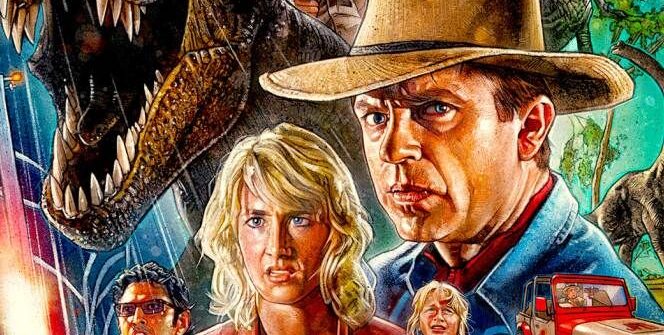
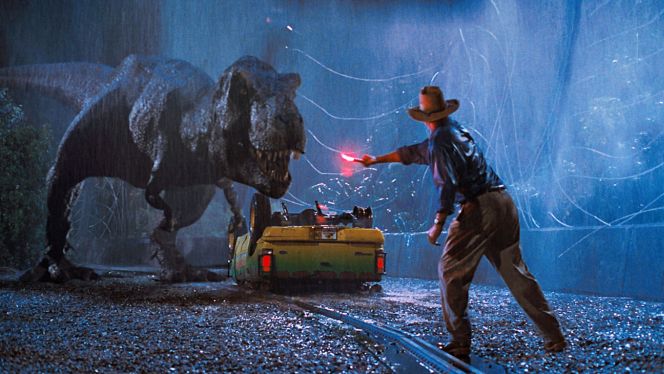
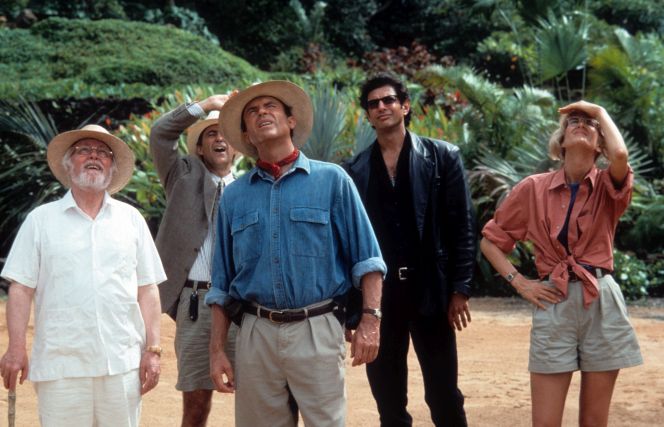
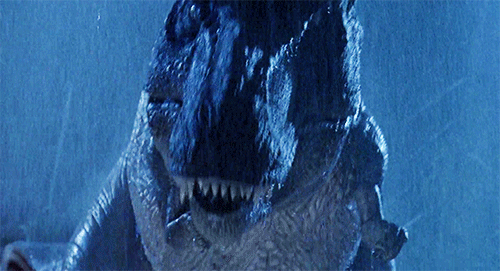
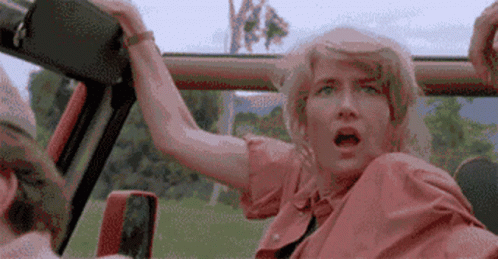


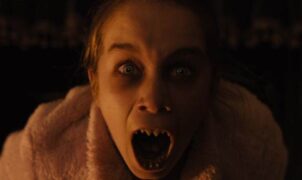
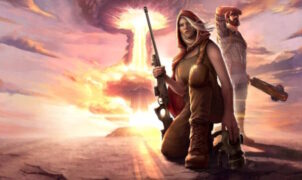

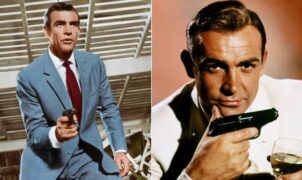


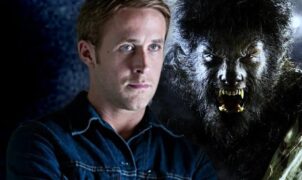


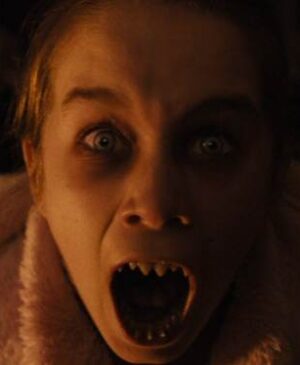
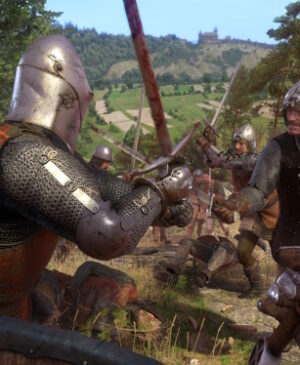
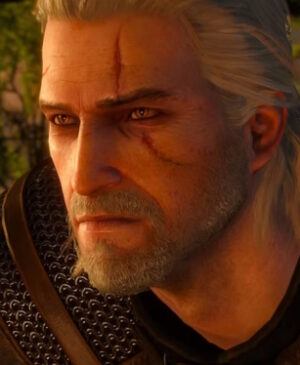
Leave a Reply